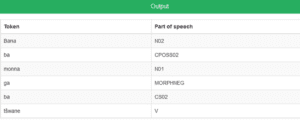
Naa part-of-speech tagger ke eng?
Author: Dimakatso Mathe (SADiLaR Sesotho sa Leboa Researcher) Part-of-speech tagger, yeo e tla bitšwago sehlathahlophantšu go tloga mo, ke sedirišwa sa theknolotši seo se dirišwago

Author: Dimakatso Mathe (SADiLaR Sesotho sa Leboa Researcher) Part-of-speech tagger, yeo e tla bitšwago sehlathahlophantšu go tloga mo, ke sedirišwa sa theknolotši seo se dirišwago
During the month of January, the isiXhosa researcher from the South African Centre for Digital Language Resources (SADiLaR), the Siswati researcher and a programmer were